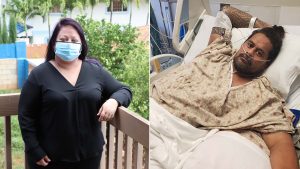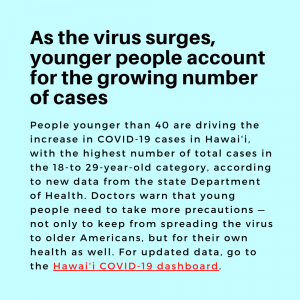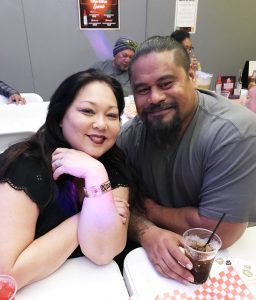The human cost of COVID-19 hits home in Hawaiʻi
Posted on Aug 27, 2020 in Capitol Connection, Featured
Sarah Bolles and Gaualofa Nua praise healthcare workers and urge everyone to protect themselves and others from COVID-19 after the virus nearly killed them. Credit (right): The Queen’s Health Systems
A 34-year-old single mom. A 45-year-old construction worker. This is Hawai‘i’s face of COVID-19 — a disease as insidious as it is deadly — infecting people of all ages, not just the elderly. As case counts grow, how do you convince people to take the virus seriously, mask up and keep their distance — no matter how tempting it is to socialize? How do you guard against something you can’t see?
Maybe it won’t hit home until you experience the headache, the high fever and the fear that comes when you can’t breathe. That’s what happened to Sarah Bolles, who tested positive for COVID-19 in March, before the state’s widespread lockdowns and restrictions. She still doesn’t know how she contracted the virus, but she remembers thinking, “I’ll never get to see my family again (she has a 13-year-old daughter). They’re going to sedate me; they’re going to put me in a coma. It happened so fast.”
The doctors at Kaiser Permanente Moanalua put Bolles on a ventilator and kept her in a medically induced coma for three weeks. She was hospitalized for a month and a half and became tearful as she described being away from her daughter and other ‘ohana. “Being isolated, away from your family was the toughest part,” she recalled. “I was near death.”
Bolles is still dealing with the physical and emotional aftermath of her experience, but she credits the doctors and nurses at Kaiser, her family’s support and her strong faith for her survival. She implores everyone to wear their masks, physically distance and stay home when they’re sick. “Just think about the lives you are saving when you’re thinking about others and not just yourself,” she said. “We need to stop the spread, and we definitely need to work together.”
Gaualofa Nua’s story of survival is even more dramatic because he became Hawai‘i’s first COVID-19 patient put on an ECMO (extracorporeal membrane oxygenation) machine for patients whose lungs and heart are failing. The machine pumps and oxygenates blood outside the body in place of those organs. Nua told the Honolulu Star-Advertiser, “I was coughing and having trouble breathing. . . I was told my heart stopped a couple of times and they were able to bring me back, so it’s been a crazy ride.”

Lofa Nua was released at the end of May after 7 ½ weeks in the hospital. He’s recovering some of his strength through physical and occupational therapy, but still needs oxygen from time to time to help him breathe. “These are residual effects because his lungs are scarred,” explained Tanya. In the meantime, they want people to take all the safety precautions seriously — especially with the rise in COVID-19 cases. As Lofa Nua told the Star-Advertiser, “It can go sideways real quick,” he warned. “Don’t be so impatient to risk your health and your life just to get out. I understand people got to work and people got to eat, but this a whole other animal. . . . Would you want to take that chance just to go to the beach?”
